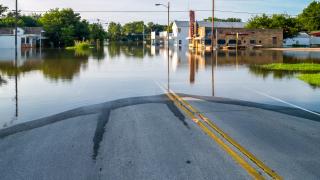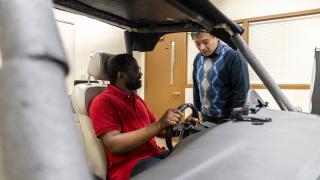
Media contact: Kristin Palm | [email protected] | 313-593-5542
Kamala Harris will formally accept her nomination as the second female major-party presidential candidate at the Democratic National Convention August 19-22. University of Michigan-Dearborn Professor of Sociology Pamela Aronson discusses what has changed since Hillary Clinton ran for president in 2016, the role reproductive freedom is likely to play in the election and the issues important to Gen Z voters.

Aronson is a nationally recognized expert on Gen Z and the author of “Gender Revolution: How Electoral Politics and #MeToo are Reshaping Everyday Life.” She has also extensively studied voters’ opinions on the gender self-presentations of political candidates. Her latest project examines the influence of reproductive freedom concerns in the 2022 and 2024 elections.
What has shifted with the way women candidates present themselves now, as compared with 2016 when Hillary Clinton was the Democratic nominee?
Women candidates face an impossible dilemma: They are expected to be competent, tough and nice all at the same time. In 2016, Hillary Clinton was berated for the tone of her voice and her “tough” style. Although she tried to “soften” her image, she was ultimately unable to overcome the sexism that she faced on the campaign trail. A lot has changed since then.
Since Trump was elected in 2016, women have been running for office in record numbers, winning seats at unprecedented rates and achieving offices that they have never occupied before. They have also effectively created more multifaceted ways of being a woman candidate that are simultaneously unapologetically confrontational, assertive, overtly feminist and yet feminine. So, for instance, starting with the 2020 Democratic primary, we saw Kamala Harris striking a balance between showing she’s tough enough to do the job of president and being likable. She uses the word “fight” a lot — “We’re going to fight for justice,” for example — and presents herself as a strong leader. At the same time, she shows a more traditionally feminine side, with things like cooking videos. I think that what we've seen so far in her short candidacy for president is that she's very relatable.
What these newer women candidates for executive positions — Harris, Michigan Governor Gretchen Whitmer and others — end up with is a more authentic self-presentation, because they don’t have to pretend that gender isn't an issue and they don't have to pretend that they’re nice all the time. They're now presenting themselves in more complex ways. So with Hillary Clinton and that generation of women politicians, there was a real focus on trying to be gender-neutral in their self presentation — we're not going to focus on gender, we're going to focus on the issues. Starting in 2018, we saw a lot of women candidates across the country leaning into gender in a new way. That’s really different than what we’ve seen before.
How have voters changed since 2016?
One of the things that's different is that candidates and voters have both leaned into women's anger — about reproductive freedom, for example. Harris has made reproductive freedom a big piece of her core campaign. For some voting groups, abortion is the number one or number two issue. In Michigan in 2022, we saw that the Right to Reproductive Freedom Initiative drew a lot of people to the polls. The state had the highest turnout of young voters in the country that year and, in one survey, 69% of women said that it was at least somewhat important in their decision to turn out. And turnout is ultimately what the election comes down to.
The #MeToo movement has also had a broad-scale impact on how people are thinking about living their everyday lives. Because so much of it was social media and electronic media, it's sort of supercharged, how the ideas spread. We had what was called the Women's March, which was another resurgence of the Women's Movement, in relation to Trump's election. In the middle of the pandemic, Black Lives Matter became very, very visible, and was also being organized through social media. We've seen, particularly among young adults, the campus protests against the war in the Middle East. All these movements and issues have arisen or evolved since 2016 and will be influencing factors.
How important a role will Gen Z play in the election and what are their concerns?
Gen Z were born between 1997 and 2012, which means that they are between 12 years old and 27 years old right now. For many voting members of Gen Z, this is their first presidential election. So it's hard to predict how they're going to vote because they haven't voted yet. But what I can say about Gen Z is that it's the most ethnically diverse generation in many ways. That’s important in thinking about what issues may be important to them.
The defining characteristic of Gen Z is coming of age in the pandemic and the aftermath of the pandemic. They faced so much disruption. My research has found that Gen Z is really feeling abandoned by older adults. And they feel sort of caught adrift from political leadership, from institutions that are supposed to nurture them, like higher education. So they're concerned about things like: How are they going to financially support themselves when there's an affordable housing crisis? How are they going to move into the career that they want when education costs a lot? There was a recent survey that found that young adults had two times the anxiety as teenagers. They were worried about their financial future and pressure to do well at school, but they also mentioned abortion bans, school gun violence and climate change. So these are the political issues that are affecting young people the most and we could expect that those kinds of concerns would have a role in how they choose to vote — and whether they choose to vote.
What is the political significance of memes to younger voters, like the recent one based on Kamala Harris and a quote about falling out of a coconut tree?
When we think about memes, what happens is, it's not just that people are reposting the same thing. There's an interaction with others and with the ideas. So you do see reposting but you also see creativity going into it and tweaking it a little bit to be representative of what the author is trying to express.
What I found really interesting about the particular example of the coconut tree meme was how much it spread. It was a spontaneous thing that young adults took upon themselves to embrace. Some people don't know the context, but they find that one line funny and they find Harris’ laugh funny, so they're interacting with her and in a way they're engaging in the election. Now, it might not be a very politically informed engagement because they might not know anything else about her. But it's something that gives her event visibility and perhaps credibility in the eyes of young voters. When they see other people posting about this, and when they themselves spend time creating a meme, they’re interacting. It shows that they're engaged, that young adults are engaged.
###






